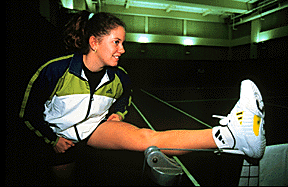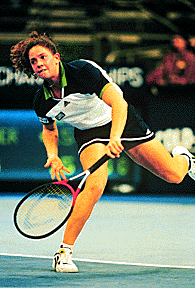<% ns_puts [mkm_getnavbar] %>
Perspectives on the Mental Game: Patty Schnyder Interview
In less than 4 years, Patty Schnyder, a virtually unknown Swiss player, has rocketed
into the world's top 10. As a Swiss junior, her career was always obscured by the
phenomenal success of Martina Hingis. Turning pro in 1994, she ended her first year at
#786 on the computer. In 1995 she jumped over 500  places
into the top 150 and by the end of 1996, she was ranked #58. Last year she cracked the top
30 and in 1998 she has vaulted into the top 10 for the first time, posting wins over
Steffi Graf, Anna Kournikova, Iva Majoli, and Arantxa Sanchez-Vicario along the way.
places
into the top 150 and by the end of 1996, she was ranked #58. Last year she cracked the top
30 and in 1998 she has vaulted into the top 10 for the first time, posting wins over
Steffi Graf, Anna Kournikova, Iva Majoli, and Arantxa Sanchez-Vicario along the way.
In a recent, exclusive interview with TennisONE special contributing editor John Yandell, Schnyder shared her views on junior and professional tennis, how her game has evolved, the role of coaches, and particularly the importance of mental attitude in succeeding in competitive tennis.
Q: What motivated you to start playing tennis?
A: I started when I was 7 years old playing with my brother and my parents on the weekends. It was fun to do any kind of sport. I also liked soccer and hockey.
Q: What would you say is the right mental attitude for aspiring juniors to take toward their game?
A: You have to have fun playing tennis. You have to enjoy your life. If it isn't fun to practice everyday, you should leave practice. You have to have the will to work hard and try the best you can. But some juniors aren't happy. You can look at them and see if they like tennis, or if they are happy with their lives.
Q: Many juniors have dreams of making it on the pro tour, but statistically
their chances are pretty close to zero. What would you say to players who have dreams
about a career in tennis, but may not ever see them come true?
A. Work hard and keep on dreaming. The players that are dreaming are enjoying tennis. Don't stop with the first loss, or the first bad season. I looked up to the stars. I was always watching them on televsion and imagining myself playing on center court. I felt strongly that I could be there.
Q: Who in particular did you look up to?
A: Stefan Edberg and later Andre Agassi.
Q: What is the key to a productive relationship with a coach?
A: The most important thing is that what he tells you works on the court. You have to believe in it. You know it's true when you try it in a match and it works.
Q: What's the difference between junior tennis and the pros?
A: The consistency of the players. The game is more powerful. There's the pressure from the media. You have to organize your life.
Q: What are the changes in your game that have allowed you to succeed at the pro level?
A: My whole game got more complete. I've learned to open the court by hitting crosscourt to the "t" points [the intersection of the service line the sidelines] and then attacking the next ball.
Q: How important is the mental aspect of the game in deciding pro matches?
A: When players are at the same level, it's the deciding point.
Q: How do you stay mentally and emotionally positive in pressure situations?
A: You have to think about your game, and not worry about your opponent. You have to look forward and not worry about the points you lose. I try to think about good points I have played in the match I'm playing or another match.
Q: What are examples of things you might tell yourself during a match?
A: "Stay focused." "Play the ball deeper." " Move into the court." "C'mon, you can do it!"
Last Updated 9/1/98. To contact us, please email to: webmaster@tennisone.com
TennisONE is a registered trademark of TennisONE and SportsWeb ONE; Copyright 1995. All rights reserved.